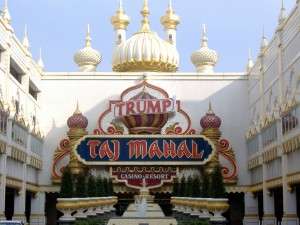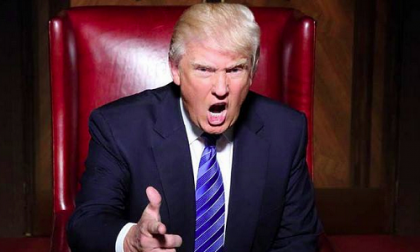New York Times Report: Donald Trump Personally Made Millions by Running Atlantic City Casinos into the Ground
Donald Trump is somehow one election away from becoming President of the United States. Throughout his campaign, the former reality show host has been criticized for (amongst MANY other things) being all bluster and no substance. He says words, putting them together in some sort of order that occasionally resembles a real sentence, but there is never any meaning behind them. He says he will be the best at this and the best at that, but he never explains how, particularly when he has no experience in governing anything.
One thing he has said repeatedly, especially in the Republican debates, was that he built great businesses in Atlantic City and was such a great businessman that he got out of Atlantic City at the right time. He was so smart, his casinos were great for the city, and he would use that savvy to “Make America Great Again.”
But did his casinos actually do well? Was he some business genius? Not so, according to an article in the New York Times this past weekend. According to journalists Russ Buettner and Charles V. Bagli, Donald Trump’s three casinos tended to do worse than their Atlantic City competitors while a wake of financial destruction trailed behind Trump as he bled the city and its people dry. As the authors so well put it:
But even as his companies did poorly, Mr. Trump did well. He put up little of his own money, shifted personal debts to the casinos and collected millions of dollars in salary, bonuses and other payments. The burden of his failures fell on investors and others who had bet on his business acumen.
The Times article is very long, so we’re not going to cover the whole thing here, but Trump followed a predictable pattern in Atlantic City. He borrowed tons of money at high interest rates, wasn’t able to make payments, then went to bankruptcy court, convincing creditors to take less money. In between, he would shift his own debts to his companies while still taking a salary and bonuses.
Trump Plaza was his first casino on the Boardwalk, opening in 1984. He wasn’t able to secure financing to build it on his land, so he partnered with Harrah’s. Harrah’s gave him $220 in financing to build the Plaza, paid him a $24 million construction management fee, and agreed to let him keep half the profits from the property. Trump put no money of his own into the project.
Of course, the egomaniac that he is, Trump felt his name should be featured rather than Harrah’s. He and Harrah’s never had a good partnership and he eventually bought Harrah’s share of the Plaza for about $220 million in 1986.

Trump Taj Mahal
Trump bought Trump Castle (later renamed Trump Marina) for $320 million. It was Hilton’s project – the Trump name was not attached until Trump bought it – and was almost completed by the time Trump got involved. His company finished construction thanks to a load of debt, issuing $352 in bonds. Trump Castle opened in 1985, meaning Trump now had two casinos competing against each other.
Similarly, Trump wasn’t the one to start construction on Trump Taj Mahal – that was Resorts International. Trump acquired a controlling interest in the company from its founder’s estate and then went to battle against Merv Griffin for complete control. In the end, Griffin got the company and Trump got the Taj.
To complete construction, Trump raised funds by issuing a whopping $675 million worth of junk bonds at 14.4 percent interest, months after telling the New Jersey Casino Control Commission that he knew plenty of lenders who would give him money at low rates. Before it opened, the Trump Taj Mahal was already $820 million in debt.
The Times described one event that followed, something that shouldn’t be surprising to anyone who has watched Trump’s behavior over the course of the past year:
Less than two weeks before the casino opened, Marvin B. Roffman, a casino analyst at Janney Montgomery Scott, an investment firm based in Philadelphia, told The Wall Street Journal that the Taj would need to reap $1.3 million a day just to make its interest payments, a sum no casino had ever achieved.
“The market just isn’t there,” Mr. Roffman told The Journal.
Mr. Trump retaliated, demanding that Janney Montgomery Scott fire Mr. Roffman. It did.
“It was doomed way before the start,” said W. Bucky Howard, who was promoted by Mr. Trump to president of the Taj five days after it opened, in a recent interview. “I told him it was going to fail. The Taj was underfunded.”
The Taj Mahal opened in 1990, but was already in bankruptcy court in 1991. The Plaza and Castle were, as well, in 1992. The lenders took half of the casinos in exchange for lower interest rates, payment deferrals, and an agreement not to go after Trump’s personal assets for five years. The total debt was still there, though.
While Trump says Atlantic City was a “cash cow” for him, his businesses hurt many. The Times notes, for example, that Triad Building Specialties, which helped build the Taj, only received 30 cents of the dollar after the Taj went into bankruptcy.
“Trump crawled his way to the top on the back of little guys, one of them being my father,” Beth Rosser, whose father ran Triad at the time, told the Times. “He had no regard for thousands of men and women who worked on those projects. He says he’ll make America great again, but his past shows the complete opposite of that.”
One of Trump’s most obnoxious scams was how he shifted his own personal debt onto others. Though the lenders delayed going after him in the first bankruptcy agreement, he was still on the hook for $100 million of his own personal money by June 30, 1995. Thus, his company issued $100 million in junk bonds in 1993 – the debt was allocated to the Trump Plaza – and Donald Trump used more than half of that cash influx to pay off his own personal loans.
Trump wasn’t done. Shortly before the June 1995 bankruptcy deadline, he created the publicly traded company, Trump Hotels and Casino Resorts, and had it take over ownership of the Plaza, along with, of course, its debts. The company’s IPO raised $140 million and another $155 million in junk bonds were issued at 15.5 percent interest. Though he now had to answer to shareholders, Trump really only had to answer to the other board members who, as one would expect, were generally “yes” men.
Some of the money raised by the new company was used to pay off more of Trump’s personal debts.
It keeps going from there. More junk bonds issued and Trump’s debts either paid off and shifted to the company and, therefore, shareholders. It was genius. Trump used the power of his name to get people to bend to his wishes, very much like what he is doing right now in the political arena.
The stock of the company tanked. The company lost money year after year. Shareholders lost money. Trump, though, got a $1 million per year salary, millions of dollars in bonuses, and even millions of dollars in loans from the company for what amounted to bullshit expenses.
And though Trump likes to claim that people loved his casinos, they really didn’t. The Times reports that revenues of non-Trump casinos in Atlantic City increased 18 percent from 1997 through 2002. The Trump casinos lost 1.1 percent.
“Had Mr. Trump’s revenues grown at the rate of other Atlantic City casinos,” the Times said, “his company could have made its interest payments and possibly registered a profit. But with sagging revenues and high costs, his casinos had too little money for renovations and improvements, which are vital for hotels to attract guests. The public company never logged a profitable year.”
All told, Trump’s casino company filed for bankruptcy five times, each time creditors taking bigger and bigger losses. Eventually, the Trump Marina (formerly Castle) sold for just $38 million in 1996. The Trump Plaza closed in September 2014. The Trump Taj Mahal almost closed, but was bailed out by investor Carl Icahn. It remains open, but it is a ghost town.
Trump’s ability to use his ego, his name, and his power to get what he wanted in Atlantic City without caring about what ruin he left behind looks a lot like what is happening right now as he runs for the highest office in the country. How he worked was summed up nicely at the end of the Times piece:
In retrospect, David Hanlon, a veteran casino executive who ran Merv Griffin’s Atlantic City operations at the time of the Resorts battle, said, Mr. Trump succeeded in repeatedly convincing investors, bankers and Wall Street that “his name had real value.”
“They were so in love with him that they came back a second, third and fourth time,” Mr. Hanlon said. “They let him strip out assets. It was awful to watch. It was astonishing. I have to give Trump credit for using his celebrity time and time again.”
Sebastian Pignatello, an investor who was into Trump’s casinos for half a million dollars, said, “People underestimated Donald Trump’s ability to pillage the company. He drove these companies into bankruptcy by his mismanagement, the debt and his pillaging.”
We encourage you to read Russ Buettner’s and Charles V. Bagli’s entire article at http://www.nytimes.com/2016/06/12/nyregion/donald-trump-atlantic-city.html.



















COMMENTS